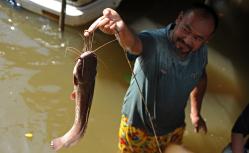Towards the end of the 2010 documentary Catfish, Nev Schulman finally meets the woman with whom he’s carried on a long-term online relationship. She is, he discovers, not young and single, but in her 40s and married. By way of metaphorical explanation, the woman’s husband, Vince Pierce, recounts the following story, which inspired the name of the film:
They used to tank cod from Alaska all the way to China. They’d keep them in vats in the ship. By the time the codfish reached China, the flesh was mush and tasteless. So this guy came up with the idea that if you put these cods in these big vats, put some catfish in with them and the catfish will keep the cod agile. And there are those people who are catfish in life. And they keep you on your toes. They keep you guessing, they keep you thinking, they keep you fresh. And I thank god for the catfish because we would be droll, boring and dull if we didn’t have somebody nipping at our fin.
Catfish the movie was followed by an MTV reality show of the same name, and, in the wake of this week’s revelations about Notre Dame footballer Manti Te’o, the term “catfish” has gone mainstream. Today, it has a narrower definition than it did when Vince Pierce used it: Typically, it refers to a person who creates a fake online profile in order to fraudulently seduce someone. It has also become a verb to refer to the act of doing so. This new, more malevolent definition, quite a leap from what Pierce seemed to have in mind, can be traced directly to the MTV series and the movie that preceded it. But where did Pierce’s catfish story come from?
Christian writers. The earliest version of the story that I’ve seen is from Henry W. Nevinson, whose 1913 book Essays in Rebellion was pointed out to me by the linguist Ben Zimmer. In one of those essays, “The Catfish,” Nevinson tells essentially the same tale—though the British Nevinson refers to the European fishing industry, rather than its North American equivalent. Nevinson explicitly compares the catfish anecdote to other allegorical Christian stories, including the tale of Faust and Mephistopheles and the Parable of the Leaven. For Nevinson, a noted suffragist, the catfish is Christianity itself, without which “the soul of Europe” would “have degenerated into a flabbiness, lethargy, and desperate peace.”
Zimmer points out that Nevinson’s essay may have been published in a periodical some time before Essays in Rebellion came out; it is cited in Charles Marriott’s novel The Catfish, which was also published in 1913.
In more recent decades, the parable of the catfish has been given a less world-historical slant by American Christians. Pastor Charles Swindoll used it in his 1988 book Come Before Winter and Share My Hope to offer personal spiritual guidance. “Each one of us is in a tank of particular and inescapable circumstances,” Swindoll writes. “It is painful enough to stay in the tank. But in addition to our situation, there are God-appointed ‘catfish’ to bring sufficient tension that keeps us alive, alert, fresh, and growing.” Swindoll’s version has been widely disseminated since then, perhaps most notably appearing in a 2007 book by the influential pastor Joel Osteen. An assistant to Swindoll told Slate that he first encountered the story in a 1983 article in the now out-of-print Fullness Magazine.
So where did Nevinson get it? Good old-fashioned reporting? Probably not: People familiar with the cod trade expressed skepticism that there was ever a market for fresh cod, which is typically processed prior to shipping. And the idea that the catfish is the “natural enemy” of the cod doesn’t hold up, either. Cod, as Jennifer Jacquet, a professor of environmental studies at NYU, explained to me, are “a population of fish (Gadus morhua) off the Eastern coast of North America,” while “the fish we most often think of as catfish are freshwater.” What’s more, “anything coming from Alaska would almost certainly be saltwater.” And “most catfish are bottom feeders—by no means voracious predators that would keep the cod agile.” Jacquet adds that “a piranha or a shark” would be a more logical choice.
